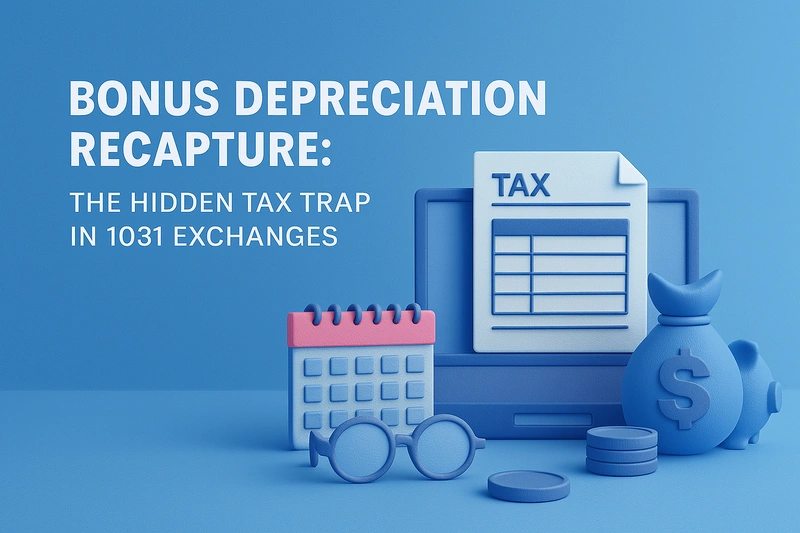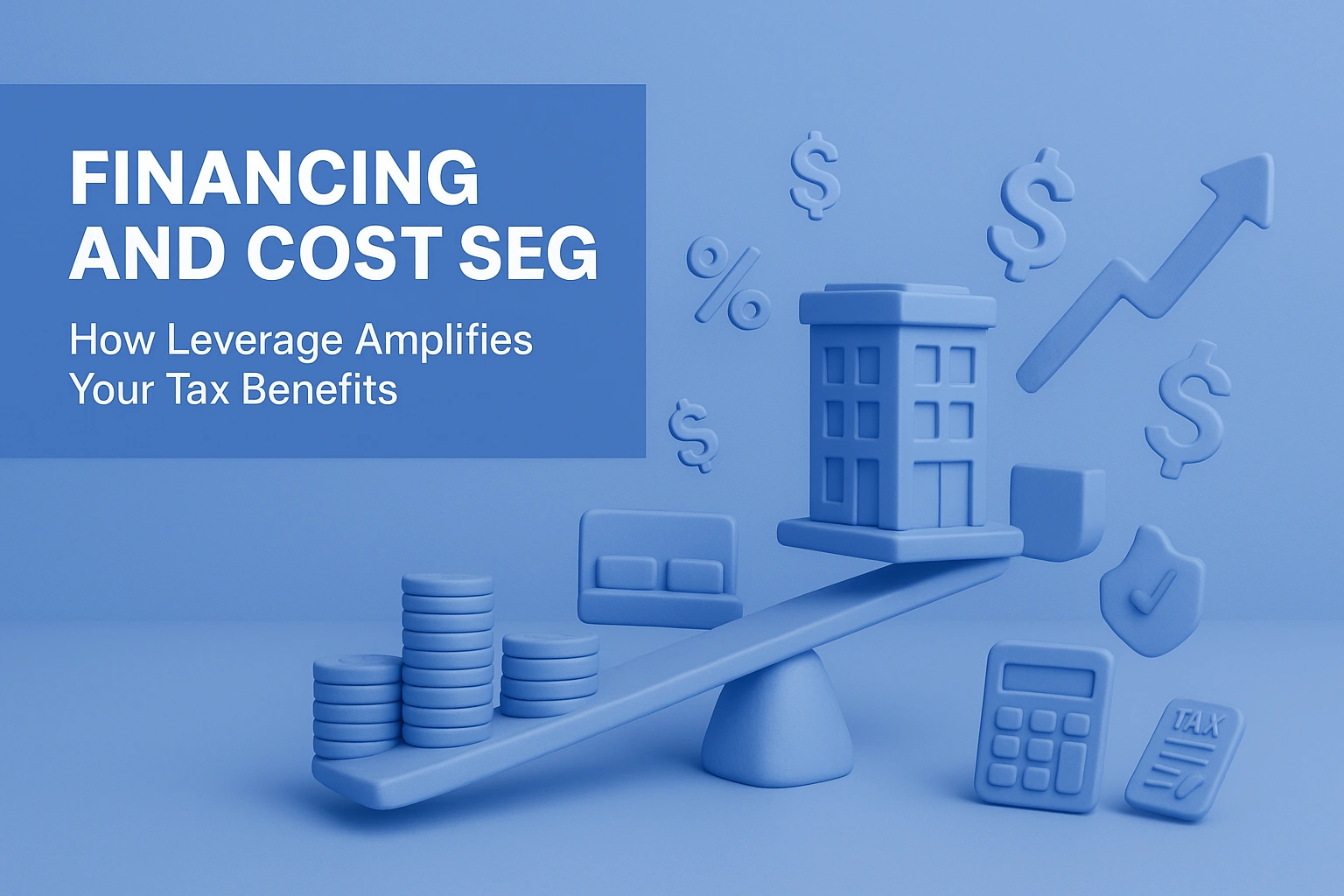When leveraging a 1031 exchange to defer capital gains on investment properties, most investors focus on meeting like-kind requirements and strict timelines. However, there's a significant tax trap lurking beneath the surface: bonus depreciation recapture. This often-overlooked aspect can trigger unexpected tax liabilities, even in otherwise perfectly executed exchanges.
Understanding Bonus Depreciation and Section 1245 Property
Bonus depreciation allows real estate investors to immediately write off a large percentage of eligible property costs in the year of purchase rather than depreciating them over time. The Tax Cuts and Jobs Act of 2017 expanded these benefits, enabling 100% first-year bonus depreciation for qualifying property placed in service between September 27, 2017, and December 31, 2022 (with phased reductions thereafter).
With the recent passage of the One Big Beautiful Bill Act in July 2025, 100% bonus depreciation has been made permanent for qualified property , creating even greater opportunities for accelerated depreciation—but also potentially increasing the recapture exposure when executing 1031 exchanges without proper Section 1245 property replacement.
This accelerated depreciation typically applies to Section 1245 property in real estate investments, which includes:
- Appliances and removable fixtures
- Carpet and non-permanent flooring
- Window treatments and removable lighting
- HVAC components and specialized systems
- Security equipment and technology infrastructure
- Land improvements (15-year property)
- Furniture and equipment
Through cost segregation studies, investors identify these components to significantly accelerate depreciation deductions and improve cash flow. However, these substantial tax benefits come with a potential future cost in 1031 exchanges.
The Section 1245 Property Replacement Requirement in 1031 Exchanges
Here's where many investors encounter an unexpected tax liability: While a 1031 exchange successfully defers capital gains tax, it doesn't automatically protect against depreciation recapture when there's insufficient replacement of Section 1245 property that received bonus depreciation treatment.
IRS regulations require that Section 1245 property must be replaced with like-kind Section 1245 property to fully defer depreciation recapture. This becomes particularly problematic when:
- You've claimed significant bonus depreciation on your relinquished property
- Your replacement property contains less Section 1245 property than your relinquished property
- You're switching between asset classes with different Section 1245 property compositions
When these conditions align, you may face recapture of previously taken bonus depreciation at ordinary income tax rates (up to 37% federal) – despite having executed an otherwise "perfect" 1031 exchange with no boot. With the permanent extension of 100% bonus depreciation under the One Big Beautiful Bill Act, more investors will likely utilize accelerated depreciation, making proper Section 1245 replacement planning even more critical.
Asset Class Transitions and Section 1245 Replacement Challenges: A Comparison
Strategic Solutions to Avoid Bonus Depreciation Recapture
1. Conduct Pre-Exchange Cost Segregation Analysis
Before finalizing your 1031 exchange, perform cost segregation studies on both your relinquished and potential replacement properties. This critical step provides precise values of Section 1245 property on both sides of the transaction, allowing you to accurately assess potential recapture exposure. With the One Big Beautiful Bill Act making 100% bonus depreciation permanent, this analysis becomes even more valuable for long-term tax planning.
2. Seek Section 1245-Rich Replacement Properties
If your relinquished property has substantial Section 1245 components that received bonus depreciation, prioritize replacement properties with equivalent or greater Section 1245 values. Look for properties with:
- Recent renovations or improvements
- Significant personal property components
- Technology or specialized systems
- Extensive land improvements
3. Consider Multiple Replacement Properties
The 1031 exchange rules allow acquiring multiple properties to replace a single relinquished property. This flexibility enables you to add a property with significant Section 1245 components to balance your overall exchange and minimize recapture.
4. Negotiate Additional Personal Property in Purchases
When purchasing replacement properties, negotiate to include additional personal property in the transaction. This might include:
- Maintenance equipment
- Office furniture and fixtures
- Removable shelving or storage systems
- Technology equipment
5. Plan for Unavoidable Recapture Tax
If some level of bonus depreciation recapture is unavoidable, proper tax planning can help mitigate the impact. Work with tax professionals to:
- Accurately calculate the recapture exposure
- Plan for the tax liability
- Explore offsetting deductions or credits
- Consider timing strategies in light of the One Big Beautiful Bill Act's permanent bonus depreciation provisions
Real-World Example: Avoiding Bonus Depreciation Recapture
An investor sold a 16-unit apartment building purchased in 2018 for $2.2 million. A cost segregation study had identified $550,000 in Section 1245 property, all of which received 100% bonus depreciation treatment. The investor planned to exchange into a small office building valued at $3 million.
Problem: Initial analysis revealed the office building contained only approximately $300,000 in potential Section 1245 property, creating a $250,000 shortfall that would trigger significant bonus depreciation recapture.
Solution: The investor took three strategic actions:
- Commissioned a detailed cost segregation study on the replacement property, which identified an additional $120,000 in potential Section 1245 property
- Negotiated with the seller to include $80,000 of removable fixtures and equipment
- Added a small retail property with $150,000 of Section 1245 property as a second replacement property
Result: By understanding the potential bonus depreciation recapture before completing the exchange, the investor successfully structured a replacement property portfolio that contained more Section 1245 property than the relinquished property, completely avoiding recapture taxation.
Step-by-Step Planning Guide to Prevent Bonus Depreciation Recapture
- Evaluate Your Relinquished Property
- Review past depreciation schedules
- Identify all Section 1245 property
- Determine bonus depreciation previously taken
- Analyze Potential Replacement Properties
- Commission preliminary cost segregation analyses
- Compare Section 1245 values to your relinquished property
- Identify potential recapture exposure
- Develop a Strategic Acquisition Plan
- Consider multiple properties if needed
- Negotiate for additional personal property
- Structure purchases to maximize Section 1245 components
- Document Property Classifications
- Ensure purchase agreements clearly identify Section 1245 property
- Maintain detailed records of property allocations
- Support classifications with cost segregation studies
- Review Exchange Structure with Tax Advisors
- Confirm recapture avoidance
- Address any remaining tax exposure
- Document compliance with IRS requirements
- Evaluate impact of the One Big Beautiful Bill Act on your long-term investment strategy
Conclusion: The Critical Importance of Section 1245 Property Replacement
Bonus depreciation provides powerful immediate tax benefits for real estate investors, but these benefits come with potential recapture risks in future 1031 exchanges if Section 1245 property is not adequately replaced. With the One Big Beautiful Bill Act making 100% bonus depreciation permanent , the stakes for proper Section 1245 replacement have never been higher.
By understanding the interaction between bonus depreciation, Section 1245 property, and 1031 exchange requirements, investors can structure transactions to maximize tax deferral. A comprehensive cost segregation analysis is essential for both identifying depreciation opportunities and planning effective 1031 exchanges that avoid recapture.
By addressing Section 1245 property replacement considerations proactively, investors can protect their accumulated tax benefits while continuing to build wealth through strategic real estate investments that take full advantage of the permanent bonus depreciation provisions in the One Big Beautiful Bill Act.
For investors considering a 1031 exchange who have previously benefited from bonus depreciation, proper planning for Section 1245 property replacement should be a central element of your tax strategy.
Frequently Asked Questions
Q: How does the One Big Beautiful Bill Act affect Section 1245 property replacement in 1031 exchanges?
A: By making 100% bonus depreciation permanent, the One Big Beautiful Bill Act increases both the opportunities for accelerated depreciation and the importance of proper Section 1245 property replacement in 1031 exchanges to avoid recapture.
Q: Can I claim bonus depreciation on my replacement property in a 1031 exchange?
A: Yes, you can claim bonus depreciation on the additional investment beyond your exchange basis and on new components that qualify as Section 1245 property.
Q: Does recapture apply if I exchange into a more expensive property?
A: The total value of the replacement property doesn't eliminate recapture risk. What matters is the specific amount of Section 1245 property in the replacement compared to what was in the relinquished property.
Q: How do I know how much Section 1245 property is in a potential replacement property?
A: A cost segregation study performed by qualified engineers and tax professionals is the most reliable method to identify and quantify Section 1245 property in any real estate investment.
Q: What if I can't find replacement properties with enough Section 1245 property?
A: Consider multiple replacement properties, negotiate to include additional personal property in purchases, or plan for the tax impact of partial recapture if it's unavoidable.






